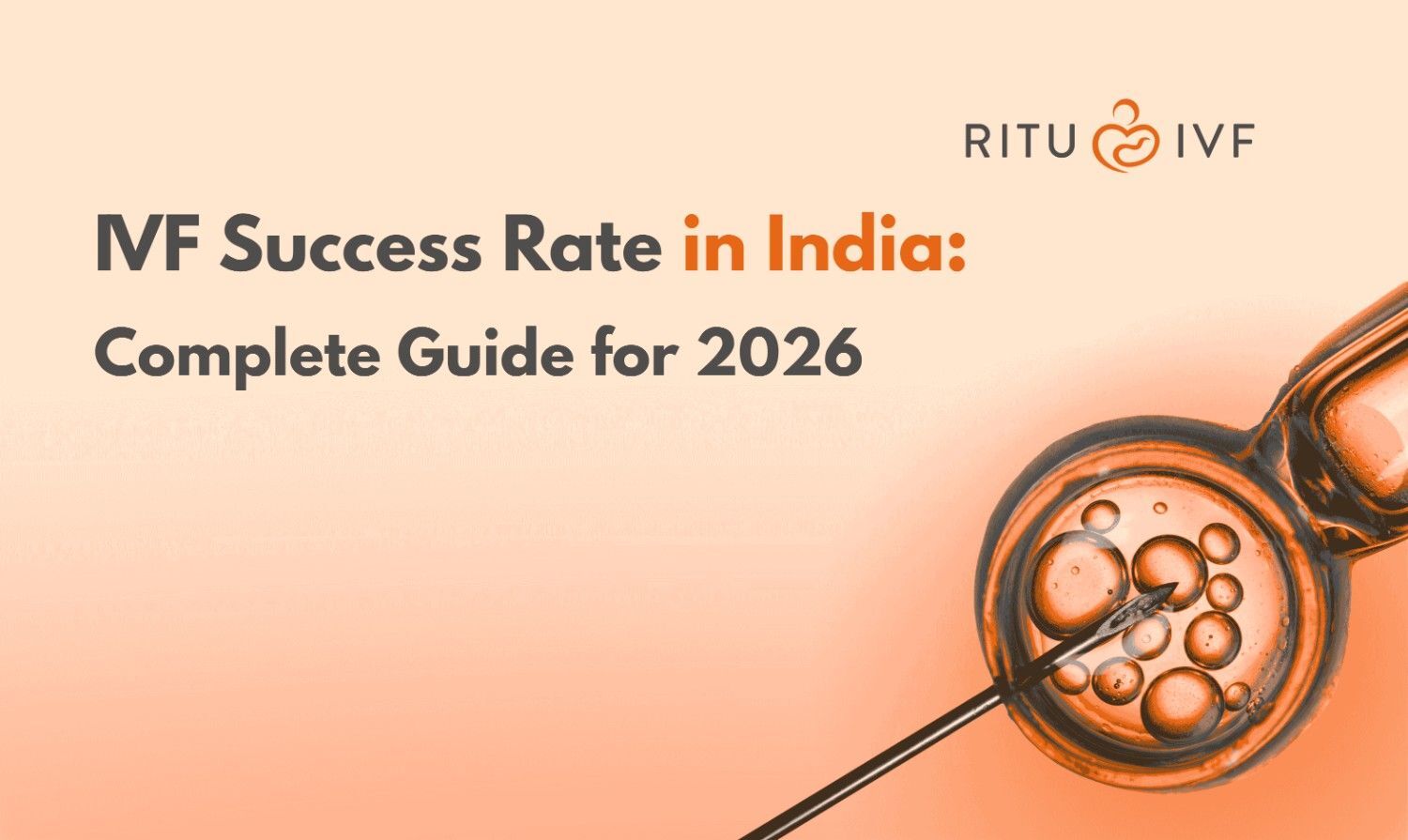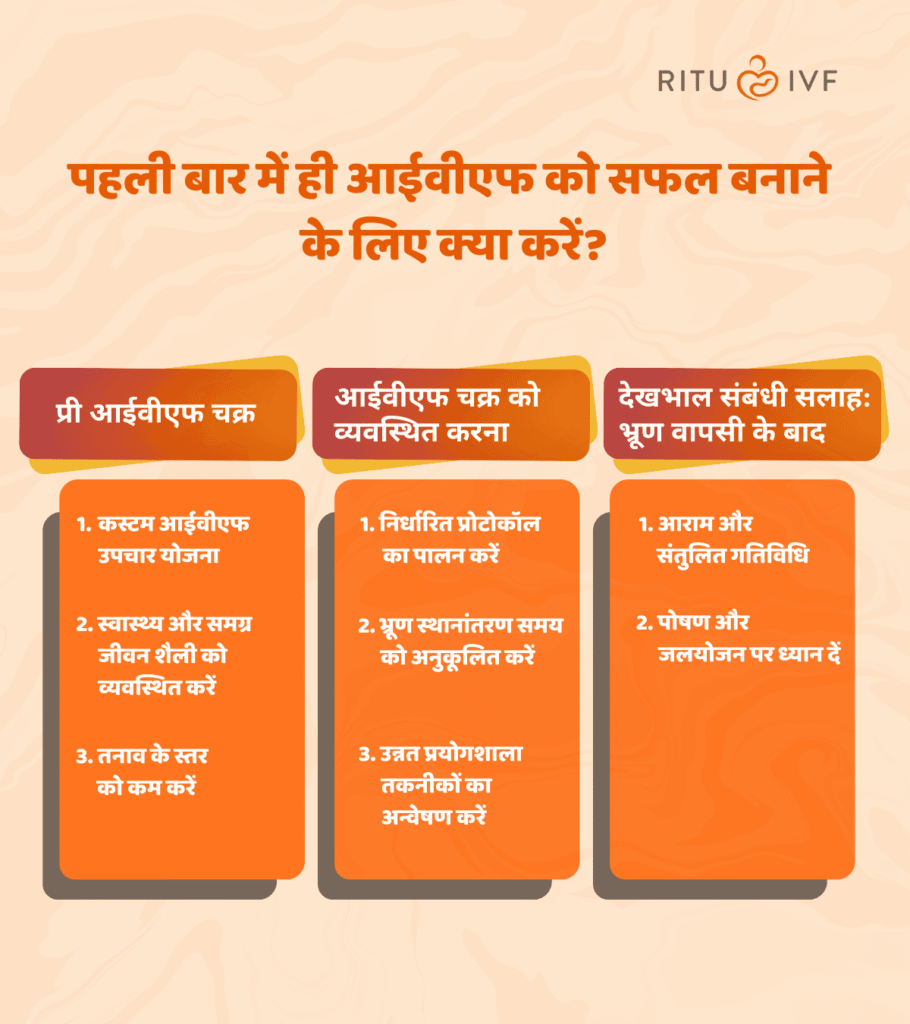आज के दौर में माता-पिता बनना हर दंपत्ति का सपना होता है, लेकिन बदलती जीवनशैली और स्वास्थ्य संबंधी समस्याओं के कारण कई जोड़ों को इस सुख को पाने में संघर्ष करना पड़ता है। यदि आप भी जयपुर में रहते हैं और लंबे समय से कोशिश करने के बाद भी सफलता नहीं मिल रही है, तो यह लेख आपके लिए है। Ritu IVF पर हमारा उद्देश्य आपको सही जानकारी और विश्व स्तरीय इलाज प्रदान करना है।

प्रेगनेंट न होने के कारण (Causes of Infertility)
गर्भधारण न कर पाने की समस्या को मुख्य रूप से तीन भागों में समझा जा सकता है: महिलाओं में कारण, पुरुषों में कारण और जीवनशैली से जुड़े सामान्य कारण।
1. महिलाओं में गर्भधारण न होने के मुख्य कारण
अनुसंधान के अनुसार, लगभग 40% मामलों में इनफर्टिलिटी का कारण महिलाओं से संबंधित होता है:
ओव्यूलेशन डिसऑर्डर (Ovulation Issues): यह सबसे प्रमुख कारण है। PCOS (पॉलीसिस्टिक ओवरी सिंड्रोम) या हार्मोनल असंतुलन की वजह से अंडे सही समय पर नहीं बनते या रिलीज नहीं होते। यदि पीरियड्स अनियमित हैं, तो यह ओव्यूलेशन की समस्या का संकेत हो सकता है।
फैलोपियन ट्यूब में ब्लॉकेज (Blocked Tubes): यदि फैलोपियन ट्यूब बंद हैं, तो अंडा और स्पर्म आपस में मिल नहीं पाते, जिससे निषेचन (fertilization) संभव नहीं होता।
उम्र का प्रभाव (Age Factor): 35 वर्ष की आयु के बाद महिलाओं में अंडों की गुणवत्ता (Quality) और संख्या (Quantity) तेजी से कम होने लगती है, जिसे कम ओवेरियन रिजर्व कहा जाता है।
एंडोमेट्रिओसिस (Endometriosis): इस स्थिति में गर्भाशय की परत (lining) बाहर की तरफ बढ़ने लगती है, जो प्रजनन अंगों के कार्य में बाधा डालती है।
2. पुरुषों में इनफर्टिलिटी के कारण
लगभग 30-40% मामलों में गर्भधारण न हो पाने की वजह पुरुषों का स्वास्थ्य होता है:
लो स्पर्म काउंट (Low Sperm Count): वीर्य में शुक्राणुओं की संख्या का कम होना।
स्पर्म की गतिशीलता (Low Motility): यदि शुक्राणु सही गति से तैर नहीं पा रहे हैं, तो वे अंडे तक पहुँचने में असमर्थ रहते हैं।
शुक्राणुओं की बनावट (Morphology): असामान्य आकार वाले शुक्राणु अंडे को फर्टिलाइज करने में कठिनाई पैदा करते हैं।
3. जीवनशैली और अन्य सामान्य कारण
चिकित्सीय कारणों के अलावा, हमारी रोजमर्रा की आदतें भी प्रजनन क्षमता को प्रभावित करती हैं:
मोटापा (Obesity): अधिक वजन शरीर के हार्मोन्स को असंतुलित कर देता है, जिससे ओव्यूलेशन और स्पर्म क्वालिटी दोनों पर बुरा असर पड़ता है।
तनाव (Chronic Stress): अत्यधिक तनाव प्रजनन हार्मोन (जैसे FSH और LH) के स्तर को बिगाड़ देता है।
थायराइड की समस्या: थायराइड हार्मोन का स्तर कम या ज्यादा होना गर्भधारण की प्रक्रिया में बाधा डालता है।
अनएक्सप्लेंड इनफर्टिलिटी (Unexplained Infertility): कई बार पति-पत्नी दोनों की सभी रिपोर्ट्स सामान्य होती हैं, फिर भी गर्भधारण नहीं होता। ऐसे मामलों में अक्सर IVF (इन-विट्रो फर्टिलाइजेशन) जैसे उन्नत उपचारों की आवश्यकता होती है।
प्रेग्नेंसी कंसीव कैसे करें: ओव्यूलेशन को समझना

गर्भधारण करने के लिए ओव्यूलेशन (Ovulation) को समझना सबसे महत्वपूर्ण कदम है। ओव्यूलेशन वह समय है जब महिला के अंडाशय (ovary) से एक परिपक्व अंडा बाहर निकलता है और फर्टिलाइजेशन के लिए तैयार होता है।
यहाँ ओव्यूलेशन और गर्भधारण की प्रक्रिया को आसान शब्दों में समझाया गया है:
1. ओव्यूलेशन का समय पहचानें (Track Your Cycle)
एक सामान्य मासिक धर्म चक्र (Menstrual Cycle) आमतौर पर 28 से 30 दिनों का होता है।
ओव्यूलेशन कब होता है? आमतौर पर अगले पीरियड शुरू होने से 12 से 16 दिन पहले ओव्यूलेशन होता है।
सबसे उपजाऊ दिन (Fertile Window): अंडे की उम्र केवल 12 से 24 घंटे होती है, लेकिन स्पर्म महिला के शरीर में 5 दिनों तक जीवित रह सकता है। इसलिए, ओव्यूलेशन से 2-3 दिन पहले और ओव्यूलेशन के दिन संबंध बनाना सबसे प्रभावी होता है।
ओव्यूलेशन के लक्षण (Signs of Ovulation)
सर्वाइकल म्यूकस में बदलाव: अंडे की सफेदी जैसा चिपचिपा और पतला डिस्चार्ज होना।
शरीर के तापमान में वृद्धि: ओव्यूलेशन के तुरंत बाद शरीर का तापमान (Basal Body Temperature) थोड़ा बढ़ जाता है।
पेट के निचले हिस्से में हल्का दर्द: कुछ महिलाओं को एक तरफ हल्का दर्द महसूस होता है।
ओव्यूलेशन किट: आप बाजार में मिलने वाली ओव्यूलेशन स्ट्रिप्स का उपयोग करके भी सही समय का पता लगा सकती हैं।
2. कंसीव करने के लिए जरूरी सुझाव
अगर आप प्रेग्नेंसी प्लान कर रहे हैं, तो इन बातों का ध्यान रखें:
नियमित संबंध (Regular Intercourse): केवल ओव्यूलेशन के दिन का इंतजार करने के बजाय, फर्टिलिटी विंडो के दौरान हर एक या दो दिन में संबंध बनाना बेहतर होता है।
हेल्दी डाइट: अपनी डाइट में फोलिक एसिड, हरी सब्जियां, फल और ओमेगा-3 शामिल करें।
तनाव कम करें: तनाव हार्मोनल संतुलन को बिगाड़ सकता है, जिससे ओव्यूलेशन रुक सकता है। योग या ध्यान (Meditation) की मदद लें।
कैफीन और धूम्रपान से बचें: अधिक चाय-कॉफी और स्मोकिंग प्रजनन क्षमता (fertility) को कम करते हैं।
3. कब डॉक्टर से सलाह लें?
यदि आपकी उम्र 35 से कम है और आप 1 साल से कोशिश कर रहे हैं, या आपकी उम्र 35 से ज्यादा है और 6 महीने से कोशिश कर रहे हैं और सफलता नहीं मिल रही, तो विशेषज्ञ (Infertility Specialist) से मिलना सही रहता है।
जल्दी प्रेगनेंट होने के लिए क्या करें? (Lifestyle & Diet)
अगर आप यह जानना चाहती हैं कि जल्दी प्रेगनेंट होने के लिए क्या करें, तो आपको अपनी मेडिकल रिपोर्ट्स के साथ-साथ अपनी लाइफस्टाइल और खान-पान पर भी ध्यान देना होगा। विज्ञान कहता है कि एक स्वस्थ शरीर में ही एक स्वस्थ गर्भ (Pregnancy) ठहर सकता है।
जयपुर के प्रसिद्ध Ritu IVF (rituivf.com) के विशेषज्ञों के अनुभव और लेटेस्ट फर्टिलिटी रिसर्च के आधार पर नीचे दी गई डाइट और लाइफस्टाइल गाइड आपके बहुत काम आएगी।
1. डाइट में करें ये बदलाव (Fertility Diet)
आपका खान-पान सीधे तौर पर आपके अंडों (Eggs) की क्वालिटी और हार्मोनल बैलेंस को प्रभावित करता है।
फोलिक एसिड और आयरन: हरी पत्तेदार सब्जियां, दालें, और अनार को डाइट में शामिल करें। यह बच्चे के विकास के लिए बहुत जरूरी है।
एंटी-ऑक्सीडेंट्स: जामुन (Berries), ड्राई फ्रूट्स (बादाम, अखरोट) और कद्दू के बीज (Pumpkin seeds) खाएं। ये शरीर के सेल्स को फ्री-रेडिकल्स से बचाते हैं और फर्टिलिटी बढ़ाते हैं।
ओमेगा-3 फैटी एसिड: अखरोट, अलसी के बीज (Flax seeds) और चिया सीड्स हार्मोन को रेगुलेट करने में मदद करते हैं।
कॉम्प्लेक्स कार्ब्स: मैदा या सफेद चीनी की जगह साबुत अनाज (जौ, बाजरा, ओट्स) का चुनाव करें। यह इंसुलिन लेवल को कंट्रोल में रखता है, जो प्रेग्नेंसी कंसीव कैसे करें में अहम भूमिका निभाता है।
2. लाइफस्टाइल में जरूरी सुधार (Lifestyle Habits)
अक्सर बच्चे न होने के कारण हमारी छोटी-छोटी गलत आदतें होती हैं। इन्हें सुधार कर आप कंसीव करने की संभावना 40% तक बढ़ा सकते हैं।
वजन पर नियंत्रण (Maintain Ideal BMI)
बहुत ज्यादा वजन या बहुत कम वजन, दोनों ही ओव्यूलेशन को रोक सकते हैं। एक संतुलित BMI (Body Mass Index) हार्मोनल बैलेंस के लिए जरूरी है।
तनाव कम करें (Stress Management)
जब आप तनाव में होते हैं, तो शरीर में ‘कोर्टिसोल’ हार्मोन बढ़ता है जो प्रजनन क्षमता को कम कर देता है। इसके लिए:
रोजाना 15-20 मिनट योग या प्राणायाम करें।
पर्याप्त नींद (7-9 घंटे) लें।
एक्टिव रहें, पर ज्यादा हैवी एक्सरसाइज न करें
हल्की वॉक या स्विमिंग फर्टिलिटी के लिए अच्छी है, लेकिन बहुत ज्यादा इंटेंस वर्कआउट से हार्मोनल इम्बैलेंस हो सकता है।
3. क्या न करें? (Things to Avoid)
| बुरी आदतें | प्रभाव (Impact) |
| कैफीन का अधिक सेवन | चाय या कॉफी के ज्यादा सेवन से फर्टिलिटी 20% तक कम हो सकती है। |
| प्रोसेस्ड फूड | बाहर का जंक फूड और ट्रांस-फैट शरीर में सूजन (Inflammation) बढ़ाते हैं। |
| धूम्रपान और शराब | यह अंडों की संख्या और पुरुषों के स्पर्म काउंट को तेजी से घटाते हैं। |
| प्लास्टिक का उपयोग | प्लास्टिक के बर्तनों में खाना गर्म न करें, इसमें मौजूद BPA हार्मोन्स को नुकसान पहुँचाता है। |
मेडिकल रिसर्च 2026: फर्टिलिटी में नई तकनीक
आज विज्ञान इतनी तरक्की कर चुका है कि कंसीव नहीं होने के कारण चाहे जो भी हों, आधुनिक तकनीक से समाधान संभव है। नई रिसर्च के अनुसार:
AI in IVF: अब आर्टिफिशियल इंटेलिजेंस की मदद से सबसे स्वस्थ भ्रूण (Embryo) का चयन किया जाता है, जिससे सफलता दर (Success Rate) 15-20% तक बढ़ गई है।
Laser Assisted Hatching: यह उन महिलाओं के लिए वरदान है जिनकी उम्र अधिक है या जिनके पिछले IVF फेल हो चुके हैं।
आधुनिक इलाज: प्रेगनेंट कैसे करें?
जब प्राकृतिक तरीके और लाइफस्टाइल में बदलाव के बाद भी गर्भधारण नहीं हो पा रहा हो, तो आधुनिक चिकित्सा विज्ञान (Modern Science) वरदान साबित होता है। जयपुर में Ritu IVF (rituivf.com) जैसी क्लीनिक उन्नत तकनीकों का उपयोग करके इनफर्टिलिटी की जटिल समस्याओं का समाधान कर रही हैं।
यहाँ आधुनिक इलाज के प्रमुख तरीकों के बारे में विस्तार से बताया गया है:
1. IUI (इंट्रायूटरिन इन्सेमिनेशन)
यह सबसे सरल और कम खर्चीला इलाज है। इसे आमतौर पर तब इस्तेमाल किया जाता है जब पुरुष के स्पर्म काउंट में मामूली कमी हो या ओव्यूलेशन में दिक्कत हो।
प्रक्रिया: इसमें पुरुष के स्पर्म को लैब में वॉश (Refine) करके सीधे महिला के गर्भाशय (Uterus) में ओव्यूलेशन के समय डाला जाता है।
फायदा: इससे स्पर्म और अंडे के मिलने की संभावना बढ़ जाती है।
2. IVF (इन-विट्रो फर्टिलाइजेशन) – टेस्ट ट्यूब बेबी
अगर आप जानना चाहते हैं कि प्रेगनेंट कैसे करें, तो IVF सबसे सफल मेडिकल तकनीक मानी जाती है।
प्रक्रिया: इसमें महिला की ओवरी से अंडे निकाले जाते हैं और लैब में पुरुष के स्पर्म के साथ मिलाए जाते हैं। जब भ्रूण (Embryo) तैयार हो जाता है, तो उसे महिला के गर्भाशय में ट्रांसफर कर दिया जाता है।
किसे जरूरत है: बंद फैलोपियन ट्यूब, गंभीर एंडोमेट्रिओसिस या अनएक्सप्लेंड इनफर्टिलिटी के मामलों में।
3. ICSI (इंट्रासाइटोप्लाज्मिक स्पर्म इंजेक्शन)
यह IVF का ही एक उन्नत रूप है, जो विशेष रूप से पुरुष बांझपन के लिए है।
प्रक्रिया: इसमें एक सिंगल स्वस्थ स्पर्म को सीधे अंडे के अंदर इंजेक्ट किया जाता है।
फायदा: यदि स्पर्म की संख्या बहुत ही कम है या उनकी गतिशीलता (Motility) शून्य है, तो भी इसके जरिए कंसीव करना संभव है।
4. लेजर असिस्टेड हैचिंग (Laser Assisted Hatching)
यह एक नई रिसर्च आधारित तकनीक है जिसका उपयोग Ritu IVF में किया जाता है।
प्रक्रिया: कभी-कभी भ्रूण की बाहरी परत (Shell) बहुत सख्त होती है, जिससे वह गर्भाशय में चिपक नहीं पाता। लेजर की मदद से उस परत को हल्का सा पतला किया जाता है।
फायदा: यह उन महिलाओं के लिए सफल है जिनकी उम्र अधिक है या जिनके पिछले IVF प्रयास असफल रहे हैं।
5. लेप्रोस्कोपी और हिस्टेरोस्कोपी
कई बार बच्चे न होने के कारण शारीरिक रुकावटें होती हैं जैसे फाइब्रॉएड या सिस्ट।
समाधान: एक छोटे से छेद के जरिए कैमरा डालकर इन रुकावटों को हटा दिया जाता है, जिससे प्राकृतिक रूप से प्रेग्नेंसी कंसीव कैसे करें की संभावना बढ़ जाती है।
निष्कर्ष (Conclusion)
प्रेगनेंट होने के लिए क्या करें, इसका सही जवाब केवल एक अनुभवी डॉक्टर ही दे सकता है। जयपुर में Ritu IVF (rituivf.com) आपकी हर समस्या का समाधान करने के लिए तैयार है। हमारे यहाँ लेटेस्ट टेक्नोलॉजी और अनुभवी विशेषज्ञों की टीम है जो आपके माता-पिता बनने के सपने को सच करने में मदद करती है।
अक्सर पूछे जाने वाले सवाल (FAQs)
Q1. शादी के कितने समय बाद डॉक्टर से मिलना चाहिए?
Ans. अगर आपकी उम्र 35 से कम है और आप 1 साल से बिना किसी सुरक्षा के कोशिश कर रहे हैं, तो आपको डॉक्टर से मिलना चाहिए। अगर उम्र 35 से ज्यादा है, तो 6 महीने की कोशिश के बाद ही विशेषज्ञ की सलाह लें।
Q2. पीरियड के कौन से दिनों में कंसीव करने की संभावना सबसे अधिक होती है?
Ans. सबसे अधिक संभावना ‘फर्टाइल विंडो’ (Fertile Window) में होती है। अगर आपका पीरियड साइकिल 28 दिनों का है, तो 10वें दिन से 16वें दिन के बीच गर्भधारण की संभावना सबसे ज्यादा होती है।
Q3. घर पर ओव्यूलेशन का पता कैसे लगाया जा सकता है?
Ans. आप बाजार में मिलने वाली ‘ओव्यूलेशन प्रेडिक्टर किट’ (LH Kit) का उपयोग कर सकती हैं। इसके अलावा, शरीर के तापमान में हल्की बढ़ोतरी और योनि से निकलने वाले डिस्चार्ज (जो अंडे की सफेदी जैसा पतला और लचीला होता है) से भी इसका पता चलता है।
Q4. क्या ओव्यूलेशन के दिन ही संबंध बनाना जरूरी है?
Ans. नहीं, क्योंकि पुरुष शुक्राणु (Sperm) महिला के शरीर में 3 से 5 दिनों तक जीवित रह सकते हैं। इसलिए ओव्यूलेशन से 2-3 दिन पहले संबंध बनाना भी बहुत फायदेमंद होता है, ताकि अंडा निकलने पर स्पर्म वहां पहले से मौजूद हो।
Q5. अनियमित पीरियड्स (Irregular Periods) होने पर ओव्यूलेशन कैसे ट्रैक करें?
Ans. अनियमित पीरियड्स में ओव्यूलेशन का दिन तय नहीं होता। ऐसे में डॉक्टर की सलाह पर ‘फॉलिकुलर स्कैन’ (Follicular Scan) करवाना सबसे बेहतर है, जिसमें अल्ट्रासाउंड के जरिए अंडे की ग्रोथ देखी जाती है।
Q6. क्या ओव्यूलेशन को प्रभावित करने वाले कुछ बाहरी कारक भी हैं?
Ans. हाँ, अत्यधिक मानसिक तनाव, अचानक वजन का बढ़ना या कम होना, नींद की कमी और थायराइड जैसी बीमारियाँ ओव्यूलेशन की प्रक्रिया को रोक सकती हैं या इसमें देरी कर सकती हैं।















